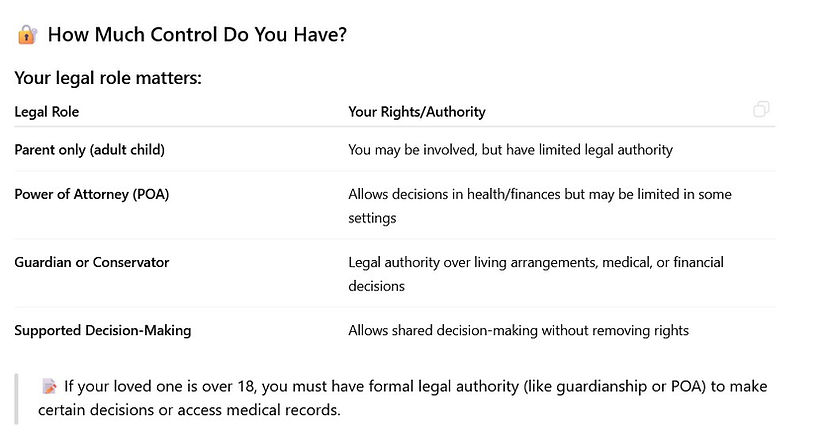Considering Group Homes or Community Living: A Guide for Caregivers
Choosing a group home or community living setting for a loved one with intellectual and developmental disabilities (IDD) is a deeply personal and often complex decision.
While these settings can offer independence and stability, they also come with challenges families should be aware of.
This guide outlines what caregivers should consider, including pros and cons, potential risks, legal considerations, and tips for navigating the process.
What Are Group Homes or Community Living Homes?
Group homes or community living arrangements are residential settings where individuals with disabilities live with others and receive support for daily living. These settings may offer 24/7 supervision, shared or individual rooms, and varying levels of independence based on individual needs.
Other models may include:
-
Shared apartments with support
-
Host homes (living with a caregiver in their home)
-
Supported independent living with staff visiting as needed
Key Considerations for Caregivers
1. Readiness & Support Needs
-
Can your loved one manage personal care, routines, and social interactions with support?
-
Would a smaller, quieter home be more appropriate than a larger group setting?
2. Medical and Medication Safety
-
How is medication administered, tracked, and stored?
-
Has the home had incidents of medication errors or medical neglect?
-
Are there protocols for emergencies and health oversight?
Note: Medication errors and even accidental deaths have occurred in some facilities. Ask direct questions about safety policies and staff training.
3. Staffing Quality and Ratios
-
What training do staff receive on disability, mental health, communication, and behavior support?
-
What is the staff-to-resident ratio?
-
How high is staff turnover?
4. Access to the Community
-
Are residents regularly supported to participate in community life (e.g., jobs, activities, social events)?
-
Or is time mostly spent indoors or on property?
5. Individual Rights and Independence
-
How much choice does your loved one have in their daily routines, roommates, meals, etc.?
-
Is the home person-centered or rule-driven?

Providers who can help:
Access Services
Where: Northampton and Lehigh Counties
Beacon Specialized Living
Group Home/Community Living
C.A.R.E.S. (Community and Residential Empowerment Svs)
Community Services Group (CSG):
Offers a Lehigh Valley IDD Program Where: 320 Highland Drive, Mountville (Lancaster)
Good Shepherd Supported Independent Living
Where: 909 South 6th Street
Allentown, Pennsylvania 18103
LifePath, Inc.
Where: 3500 High Point Boulevard, Bethlehem, PA 18017
Call: 610-264-5724
Step By Step, Inc.
Where: 623 West Union Blvd, Bethlehem, PA 18018
Call: 610-867-0688
Website

Potential Risks and Deficits to Watch For
-
Medication mismanagement
-
Neglect or abuse due to poor oversight
-
Lack of individualized care
-
Resident-to-resident conflict
-
Limited or token access to community
-
Communication barriers if staff are unfamiliar with non-verbal individuals
-
Turnover in direct support professionals (DSPs) leading to instability
How Hard Is It to Get In?
-
Group homes often have long waitlists—sometimes years.
-
Admission often happens only during a crisis (e.g., caregiver death, hospitalization).
-
You may have little choice in location or housemates if you wait too long to plan.
What You Can Do:
-
Get on state waiver waitlists early
-
Connect with your state's developmental disabilities agency
-
Tour homes and meet providers before a crisis
-
Advocate persistently—you may need to follow up regularly

Conflict: What If Something Goes Wrong?
If you are concerned about your loved one’s placement:
Steps to take:
-
Document your concerns (incidents, behaviors, communication issues).
-
Request a meeting with the home’s supervisor or care coordinator.
-
Contact the state oversight agency or ombudsman if needed.
-
Use your legal authority to request a new placement if the environment is unsafe or inappropriate.
-
Engage an advocate (e.g., legal aid, disability rights organization) if you feel dismissed.
You do have the right to raise concerns and advocate for your loved one’s safety, dignity, and well-being.